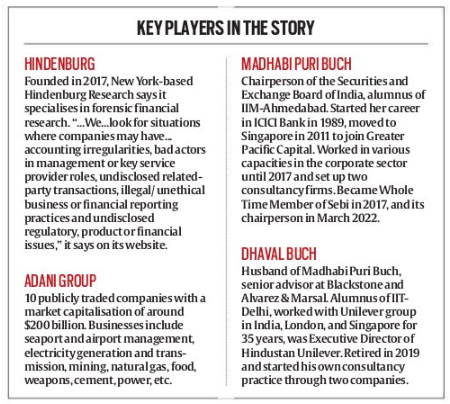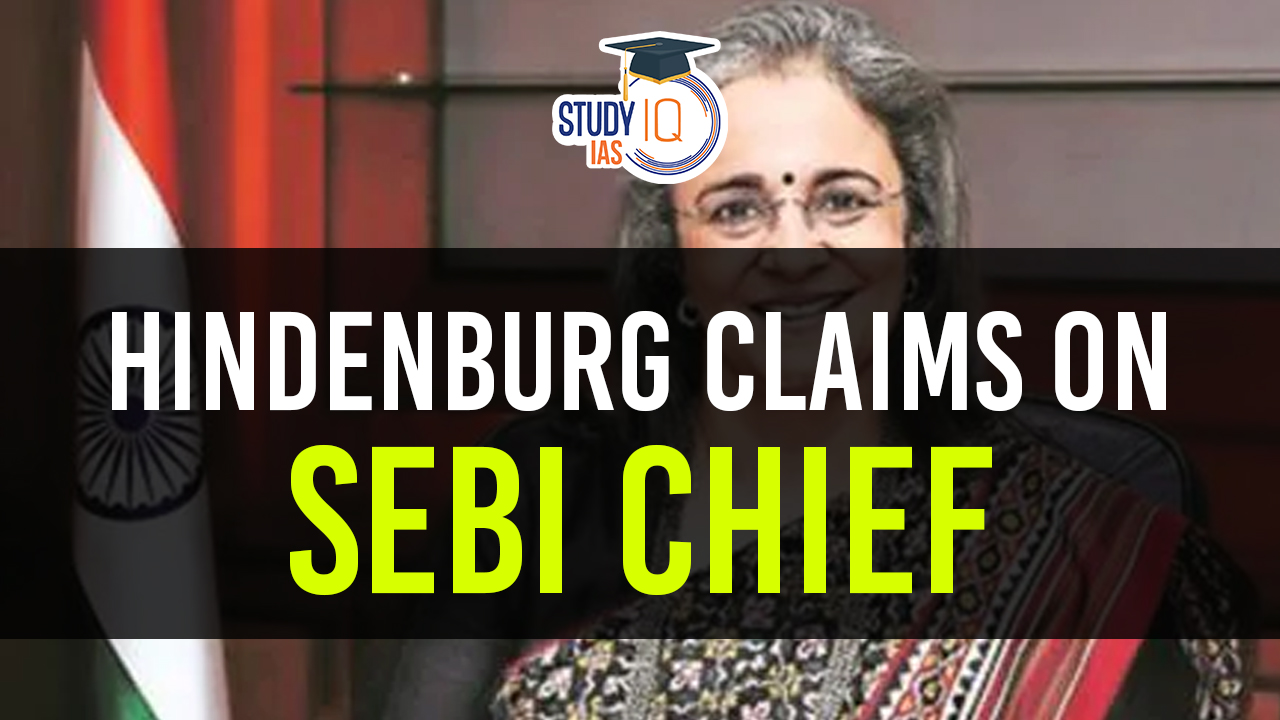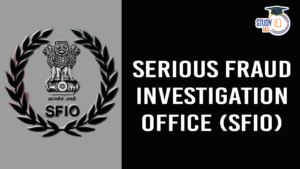Table of Contents
Hindenburg Research intensified its conflict with SEBI and its chief, Madhabi Puri Buch. The new allegations raise concerns about a potential conflict of interest. Hindenburg alleged that Buch and her husband had hidden stakes in the same offshore Bermuda and Mauritius funds linked to Vinod Adani.
Supreme Court application seeks conclusion of SEBI investigation into Adani Group amid Hindenburg Research allegations. An application filed in the Supreme Court on 13th August 2024 said the new Hindenburg Research’s allegations against SEBI chairperson Madhabi Buch create an “atmosphere of doubt”, making it incumbent for the court to conclude its investigation against the Adani Group and declare its findings.
Background of Hindenburg Research Report
Earlier, Hindenburg Research accused the Adani Group of “brazen stock market manipulation” and “accounting fraud,” the group denied these allegations, and the Supreme Court ruled out the need for a CBI or court-monitored probe.

What are the Key Allegations of Hindenburg Report?
- Hidden Stakes: Hindenburg alleges that Buch and her husband had hidden stakes in the same offshore Bermuda and Mauritius funds linked to Vinod Adani.
- Communication with Offshore Funds: During her tenure as a whole-time Securities Exchange Board of India (SEBI) member, Buch allegedly communicated with the managers of the offshore fund and redeemed units in the fund through India Infoline.
- Singapore Consulting Firm: Buch reportedly had an interest in an offshore Singapore consulting firm, Agora, transferring her shares to her husband two weeks after becoming SEBI chairperson.
SEBI Chief Madhabi Puri Buch’s Defence
- Disclosures: Buch claims that all required disclosures have been made to SEBI.
- SEBI Code: SEBI’s code for board members requires disclosure of interests that may conflict with their duties, along with transactions involving family members.
Issues Raised
- Transparency and Public Disclosure: Despite Buch’s defence, questions arise about why these disclosures were not made public, especially when the regulator was investigating the Adani Group.
- Conflict of Interest: The need for public disclosure of any connections between the regulator and the regulated, similar to how members of Parliament declare their assets.
SEBI’s Investigation
- Supreme Court Expert Committee: The committee noted that SEBI had “drawn a blank” in its inquiry to identify contributors to the foreign portfolio investors in the Adani Group.
- Regulatory Integrity: The allegations against Buch put SEBI’s integrity and independence under scrutiny, necessitating a thorough investigation and public disclosure of all relevant information.
Potential Implications
- Regulatory Independence: Questions over Buch’s associations and the possible conflict of interest could undermine the market regulator’s credibility.
- Political Slugfest: The issue risks becoming a political controversy, distracting from the larger issues of propriety and conflict of interest.
Call to Action
- Urgent Investigation: A blunt denial is insufficient; a detailed investigation and full disclosure are essential to maintain SEBI’s integrity.
- Strengthening SEBI: To protect the regulator’s autonomy and ensure its effectiveness, all stakeholders, including SEBI and the government, must act urgently.
- Higher Standards: The Indian market, being the world’s 4th largest by market cap, needs a robust and transparent regulatory framework with stringent conflict of interest standards.
Hindenburg Research’s Role
- Naming Inspiration: The firm is named after the LZ 129 Hindenburg airship disaster of 1937, symbolising its focus on catastrophic failures in corporate governance or financial structures.
- Forensic Financial Research: Hindenburg Research specialises in identifying and publicising financial discrepancies and potential frauds within companies, particularly focusing on what it terms as “man-made disasters” in the market.
- Method of Operation: The firm engages in short selling, which involves selling borrowed stocks at high prices and buying them back at lower prices to profit from anticipated declines in stock prices.
- Previous Accusations Against Adani: In January 2023, Hindenburg accused the Adani Group of stock market manipulation and accounting fraud. This report caused significant market turmoil and political controversy, as Hindenburg admitted to having short positions in Adani, benefiting financially from the drop in Adani stocks.
Implications for SEBI
- Market Confidence: The allegations raised by Hindenburg against the Adani Group, and the involvement of SEBI’s Chairperson Madhabi Puri Buch in related investments, have raised serious concerns about conflicts of interest and the integrity of SEBI’s leadership.
- Scrutiny of Regulatory Actions: These revelations put SEBI under scrutiny regarding how it handles disclosures, conflicts of interest, and its overall transparency in regulating market activities, particularly those involving significant market players like the Adani Group.
- Need for Rigorous Disclosure: The situation underscores the necessity for stringent disclosure requirements within SEBI, ensuring that all potential conflicts of interest involving its officials are adequately addressed and made transparent to uphold investor confidence and market integrity.
- Evaluation of Internal Processes: The accusations necessitate a thorough review of SEBI’s internal regulatory and oversight mechanisms to prevent similar issues in the future and to reinforce its role as a trustworthy and impartial regulatory authority.


 Serious Fraud Investigation Office (SFIO...
Serious Fraud Investigation Office (SFIO...
 Article 142 of Indian Constitution, Sign...
Article 142 of Indian Constitution, Sign...
 Pakistan-Occupied Kashmir (PoK): History...
Pakistan-Occupied Kashmir (PoK): History...





















